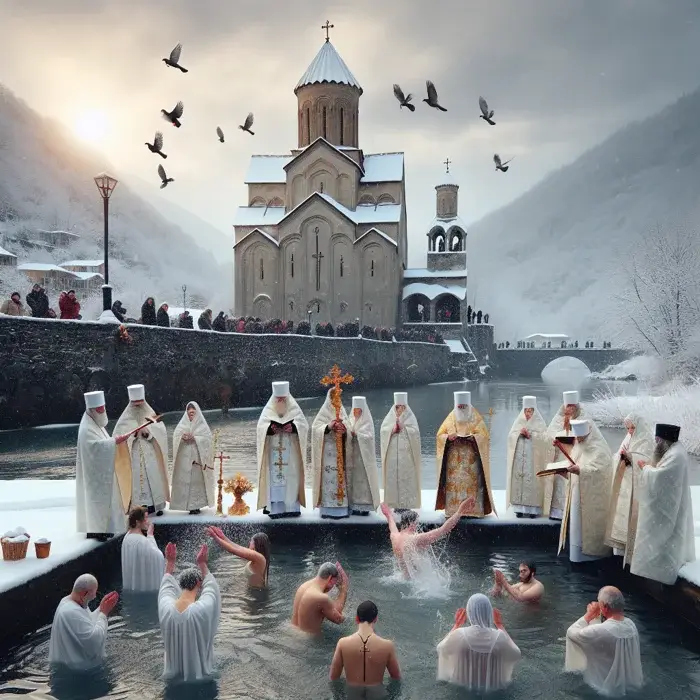Orthodox Epiphany in Georgia
Use our holiday API to get the exact date of Orthodox Epiphany in Georgia in every year.
Introduction

One of the significant religious observances celebrated in Georgia is Orthodox Epiphany which is, in essence, remembered for the baptism of Jesus Christ by John the Baptist in the River Jordan. Besides being known as "Theophany", this feast day is considered an important juncture in the liturgical calendar of the Georgian Orthodox Church. Through this article, we will explore Orthodox Epiphany's in-and-out definitions, history, and traditions.
Meaning and Importance of Orthodox Epiphany
Orthodox Epiphany is literally translated in Greek "Theophany", whereby all three words refer to "the manifestation of God". To the faithful, it is of considerable religious import because it celebrates the revelation of the Holy Trinity: the father spoke from heaven, the son was baptized, and the spirit descended in the form of a dove. Today also marks the beginning of Jesus' public mission between the heavens and humankind.
Date of the Feast
Epiphany is not a celebration on January 19th; January 19th in the Julian calendar happens to correspond to January 6th in the Gregorian calendar, which is used by most other Christian denominations. Because of that one date, all the believers can enjoy the longstanding practices related to this sacred time.
Activities and Traditions Sacred Ceremonies

Orthodox Epiphany in Georgia is marked by the various traditional religious services. The day often starts with a holy church service followed by the blessing of water; this rite holds significant stature as "Agiasma". During this rite, clergy bless water drawn from streams, lakes, and other local water resources, symbolizing the baptism of Christ. The faithful take blessed water home, as it is believed to be pure and possess healing properties.
Holy Processions
Processions are organized throughout the towns and villages as believers march to the waters' edge from the church building; these processions are bedecked with prayer, hymn-singing, and icon and cross-carrying, thereby generating a feeling of commingling among hearts.
Reenactments of Baptism
Public reenactments of Jesus' baptism bring many Orthodox Christians to undergo symbolic immersions in cold rivers or lakes. It is a renewal of spirit but also a testament of the strength of faith, for overcoming spiritual challenges is represented by cold water.
Public Life on Orthodox Epiphany
Orthodox Epiphany is a public holiday in Georgia, resulting in the closure of schools, most businesses, and government institutions. Banks and museums are typically closed to allow families to participate in the religious rituals and celebrate grandly together in tradition. With the doors closed, the community thickens in its focus on faith and family engagements.
Historical Context and Evolution

Orthodox Epiphany has its source in the attempts of the early Christian church to institute special observances for the events in the life of Christ. The feast became part of the Eastern Orthodox tradition for the particularizing collective theophanic aspect of the theology, which holds the Trinity together. Over the years, various local practices and traditions enriched the feast, and it became distinctively Georgian, yet still common to all Orthodox Christians.
Conclusion
What Georgia celebrates as Orthodox Epiphany is an index of what fidelity to faith and grounds of culture mean. Its mores and spirituality illustrate the connectivity of divine and human experience. Even as Georgians congregate to reaffirm their faith and share sacred rites, they always remind themselves that the celebration of Epiphany is an elegant recollection of deep religious heritage and community bonding.
Knowing the meaning, history, and customs involved in celebrating the Orthodox Epiphany enriches the understanding of Georgian culture and the lasting influence of Orthodox Christianity-and, therefore, it also catapults appreciation.